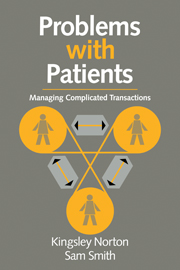Book contents
- Frontmatter
- Contents
- Foreword by Professor Paul Freeling, O.B.E.
- Preface
- Acknowledgments
- 1 Doctor–patient interaction
- 2 The clinical transaction
- 3 Interpersonal influences
- 4 The influence of past relationships
- 5 Contextual influences
- 6 Managing complicated clinical transactions
- 7 Interventions in complicated clinical transactions
- 8 Implications for the clinical setting
- 9 Implications for training
- Appendix I Clinical phenomena related to ‘problem patients’
- Appendix II Personality disorder
- References
- Index
Foreword by Professor Paul Freeling, O.B.E.
Published online by Cambridge University Press: 19 March 2010
- Frontmatter
- Contents
- Foreword by Professor Paul Freeling, O.B.E.
- Preface
- Acknowledgments
- 1 Doctor–patient interaction
- 2 The clinical transaction
- 3 Interpersonal influences
- 4 The influence of past relationships
- 5 Contextual influences
- 6 Managing complicated clinical transactions
- 7 Interventions in complicated clinical transactions
- 8 Implications for the clinical setting
- 9 Implications for training
- Appendix I Clinical phenomena related to ‘problem patients’
- Appendix II Personality disorder
- References
- Index
Summary
I have spent more than forty years in clinical practice, nearly all of that time as a general practitioner. The arena in which I perform (compete?) as a general practitioner is the clinical consultation, and the environment in that arena depends upon the nature and quality of my relationship with each person who consults me. The study of the process of consultations and of the quality of doctor–patient relationships is, then, a proper occupation for any clinician, but most especially for a generalist. The motivation for undertaking such study is a pervasive sense of discomfort experienced by the empathic doctor who has just conducted an unsatisfactory (unsatisfying?) encounter with a patient. For the patient there is escape into the real world since his or her performance in consultation is not a professional obligation. As one humorist worded it: ‘My doctor is nice; every time I see him I feel ashamed of what I think of doctors in general.’
As generation succeeds generation, the proper study of humans produces fresh theories and models to explain human behaviour in dyads and in groups large and small. Kingsley Norton and Sam Smith have taken human encounters and applied to them an appropriate range of new ideas and old. You may share in my experience of pleasure when I survive a difficult consultation without harming the patient or of dealing with my lack of satisfaction without being punitive to client or staff. If so you will find this book illuminating, rewarding, and instructive to read. Professor Paul Freeling, O.B.E.
- Type
- Chapter
- Information
- Problems with PatientsManaging Complicated Transactions, pp. xi - xiiPublisher: Cambridge University PressPrint publication year: 1994



